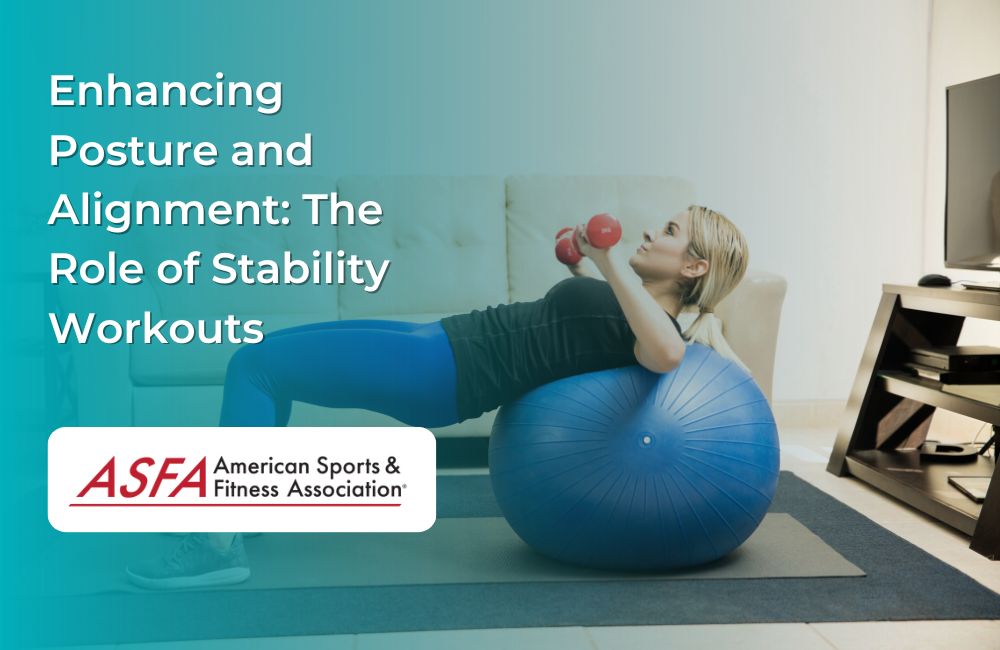Good posture and proper alignment are not just about looking confident and healthy; they are crucial for overall well-being and functionality. Stability workouts play a significant role in achieving and maintaining optimal posture and alignment. In this guide, we'll explore the importance of posture, how stability workouts can enhance it, and practical exercises to help you stand tall and feel your best.
Chapter 1: The Importance of Posture
1. Defining Good Posture
Good posture involves maintaining the body in a balanced and aligned position, with minimal strain on muscles and ligaments.
2. Health Implications
Poor posture can lead to musculoskeletal problems, back pain, and reduced mobility, affecting your quality of life.
3. Functional Benefits
Good posture enhances breathing, digestion, and overall body function, contributing to vitality and well-being.
Chapter 2: The Role of Stability Workouts
1. Core Stability
Stability workouts focus on strengthening the core muscles, which are essential for maintaining proper alignment and posture.
2. Muscle Imbalances
Stability exercises address muscle imbalances that can pull the body out of alignment.
3. Awareness and Control
Stability workouts improve body awareness and control, allowing you to make conscious adjustments to your posture.
Chapter 3: Stability Exercises for Posture Enhancement
1. Planks
Planks are excellent for building core strength and stability, key elements of good posture.
2. Glute Bridges
Strengthening the glutes and lower back muscles helps support the spine and maintain an upright posture.
3. Bird Dogs
Bird dog exercises improve balance and coordination, aiding in posture correction.
Chapter 4: Advanced Stability Exercises
1. Stability Ball Workouts
Stability or half-dome balls challenge balance and core stability, facilitating postural improvements.
2. Medicine Ball Twists
Medicine ball exercises engage the core and obliques, contributing to better alignment.
3. Suspension Training
Suspension workouts offer advanced stability exercises that target the core and upper body, enhancing posture.
Chapter 5: Incorporating Stability into Daily Life
1. Sit Less, Stand More
Use a standing desk to reduce the negative impact of prolonged sitting on posture.
2. Ergonomic Awareness
Optimize your workspace and furniture for better posture during everyday tasks.
3. Mindful Posture
Practice mindfulness to maintain awareness of your posture throughout the day.
Chapter 6: Posture and Confidence
1. The Mind-Body Connection
Good posture fosters confidence, as it can influence how you perceive yourself and how others perceive you.
2. Psychological Benefits
Improved posture can boost mood, reduce stress, and enhance self-esteem.
Chapter 7: Consistency is Key
1. Daily Practice
Incorporate stability exercises into your daily routine to make lasting improvements in posture.
2. Progression
Gradually increase the intensity and complexity of your stability workouts to continue reaping the benefits.
Stand Tall, Live Well
Optimal posture and alignment are not just aesthetic goals; they are essential for overall health and function. Stability workouts offer a path to better posture by strengthening your core, addressing muscle imbalances, and enhancing your awareness of body alignment. By integrating these exercises into your daily life and staying consistent, you can stand tall, feel confident, and enjoy the physical and psychological benefits of excellent posture. So, embark on this journey towards enhanced posture and overall well-being—it's a decision that will positively impact your life.





